Universal pre-K bill would give tax breaks to child care providers — but they doubt it’s enough
Photo courtesy of Vermont Agency of Education
As lawmakers evaluate a bill focused on universal public preschool, they are also considering ways to strengthen Vermont’s fragile network of private child care providers. One proposed way is through a property tax exemption — but some providers say it’s a good start but wouldn’t do much to lower expenses for them or families they serve.
“If the pre-k portion were to come to fruition … even just missing one child — the savings and property tax isn't enough to help my income,” said Staci Otis, who runs a home-base child care and preschool program in Springfield.
The bill, S.56, would give tax breaks up to $10,000 for property used by a child care provider. The two groups that would qualify for this are home-based child care providers, who are using their home to provide child care services, and those renting a space to a child care provider for them to provide those services.
That proposal came after concerns that the universal pre-K program would likely cut into the business of an already struggling industry — child care centers have been plagued by staffing declines and shortages in recent years, exacerbated by the Covid-19 pandemic.
When building the bill, senators thought, “What possible incentives can we provide for day care centers?” said Sen. Virginia Lyons, D-Chitteden, one of the sponsors, in a Senate Committee on Health and Welfare meeting last month.
“The cost of running a childcare center is pretty huge. And the cost of paying for workforce is huge,” Lyons said later in an interview. “We want to increase that payment for the center and for the workers who are there.”
But providers like Otis — while not opposed to the measure — doubt the incentive will move the needle.
“When I think of property taxes that I would save, it doesn't even equal out to one child's tuition throughout the year,” she said.
For landlords renting their space to providers to qualify for the tax break, they would need to set the rent at least 25% below the fair market value for the property.
So seeing any benefit from the tax exemption depends on a provider’s landlord willingness to rent at a low rate.
“I don't own my building,” said Trish Scharf, the owner and director of Children Unlimited in Williston. “So it would depend on whether or not our landlord would be willing to charge us a lesser lease rate.”
Providers had also been concerned about an earlier proposal in the bill that would have allowed 4 year olds to enter the public pre-K system, but legislators ended up striking that from the bill.
Still, providers agree that the bill is a good start.
“I don't foresee any rates ever being lowered for sure,” said Ronda McAllister, who owns and runs The Learning Tree Child Care Center in Enosburg Falls. “But it would definitely help. Anything helps, and that would definitely be something that would help.”
Lawmakers have continued to look at other ways the bill can help families and private providers. One of these provisions would be increasing eligibility for the state Department for Children and Families’ Child Care Financial Assistance Program, which gives families in need subsidies to pay for child care.
“The increased Child Care Family Assistance Program is a large part of our consideration,” Lyons said. “So looking at how can we increase the payment to families that then goes — the payment for kids — that goes to the child care center.”
Otis said doing so would help providers, not just families. Increasing the number of families eligible for the program would allow more families to access child care, and private providers can be reimbursed for providing services to families in subsidy programs.
Scharf, the Williston provider, noted that any extra money from lower rent or more families in the child care assistance program would likely go toward paying her employees more.
“The quality of adults in the building equals the quality of the program … So you want to make sure that those people are educated and experienced and have the right temperament,” Scharf said. “And it's hard to do that and to stay in this business when you're getting very little compensation.”
Lyons said legislators will continue to look at the bill to make changes and improvements.
“I do think that if we can begin stabilizing our child care centers and families, we'll be taking a huge step in a lot of different directions for kids for economic development and just for the health of our community and state,” Lyons said.







